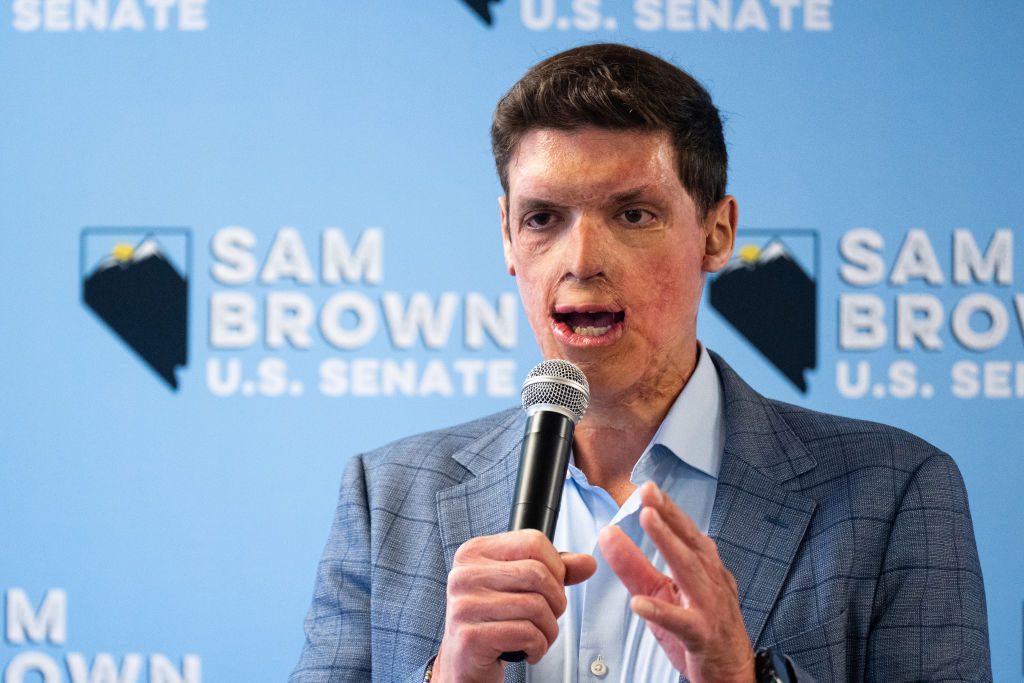
Nevada Republican candidate for Senate Sam Brown speaks at the Cafe de Manila in Las Vegas on Tuesday, Septamber 3, 2024. The event was held at the Filipino restaurant for Sen. Lindsey Graham to announce his resolution on Chinese aggresion towards the Philippines. (Bill Clark/CQ-Roll Call, Inc via Getty Images)
Brown ran a company that served as a pharmacy benefit manager (PBM) and has been a vocal defender of PBMs, which have been shown to raise drug costs for patients. He also opposed Democratic measures to lower prescription drugs costs and to allow Medicare to negotiate for lower drug prices.
Republican Senate candidate Sam Brown has repeatedly touted his experience as a small business owner while on the campaign trail in Nevada. But what’s typically gone unmentioned is that his company operated as a pharmacy benefit manager (PBM), a sort of drug industry middle-man — and PBMs have historically been known to increase costs for patients and engage in anti-consumer practices.
Brown founded Palisade Strategies LLC in 2012 while living in Texas; his company connected Veterans Affairs (VA) medical centers with pharmaceutical companies, acting as a PBM.
In 2018, the year Brown moved to Nevada, his company partnered with Heritage Health Solutions, a larger health consulting company through a US Small Business Administration-designated Mentor-Protégé Agreement, opening the door to more federal contract opportunities.
During this partnership, Brown’s “small business” brought in $7.2 million in federal contracts and he reported paying himself a six-figure salary as part of his financial disclosure reports for his failed 2022 US Senate campaign.
Wait, what’s a PBM?
PBMs are companies that effectively serve as intermediaries between insurance companies, drug manufacturers, and pharmacies, negotiating to determine how much insurers pay drug makers as well as the payments pharmacies receive. In return, PBMs receive administrative fees from all three entities, but they can also generate revenue from other streams.
Part of their role is to negotiate rebates from drug makers so insurance plans get a discount on the drug’s “list price.” While PBMs are theoretically supposed to pass the full value of the rebate onto the consumer, they sometimes keep a portion of it. This incentivizes them to steer patients to higher-priced drugs with higher rebates.
PBMs also often receive a higher payment from insurers than what they pay to pharmacies for the drug, which further pads their profits at the expense of patients, who ultimately bear higher costs.
In recent years, lawmakers from both parties have begun to focus on PBMs as a key driver of rising drug costs.
Brown’s close ties to the pharmaceutical industry
In a series of since-deleted blog posts, Brown’s company repeatedly defended PBMs against criticism from both Democratic and Republican lawmakers.
In one post from 2019, the company wrote that “if you listen to the recent rants about the lack of value PBMs provide to the market, you could easily be convinced that these businesses are profiting at the expense of sick people.” In another post from 2021, the company wrote that “this dynamic market continues to need PBMs now and clearly into the future.”
Notably, both Heritage Health and Palisade Strategies also have a history of complaints about the way they conduct business and spend taxpayer money – and some of these complaints surfaced while Brown was still running his company.
In 2019, both companies were accused of exploiting federal guidelines by misrepresenting the size and responsibilities of their respective companies and employees to improperly win government contracts.
An official complaint was filed with the Small Business Administration (SBA) which stated that Brown’s company was “unusually reliant” on its partnership with Heritage Health, as it is an “extremely small government contractor with next to no federal government contract experience.”
According to the complaint, patients weren’t properly serviced by Palisade due to the fact that they were being helped by those with little to no pharmacy experience who were supposed to just be doing administrative tasks. Broadly, the filing concludes that Palisade was unqualified for the government contracts they obtained improperly in the first place.
Ultimately, the SBA dropped the case on a technicality.
Then in 2022, the Department of Justice found that Heritage Health Solutions used a “flawed benchmark” that could have allowed it to charge “substantially greater than the average sale price” for certain drugs.
Heritage Health Solutions is also currently being audited by the federal government in relation to its contracts for PBM services for the US Marshals.
In 2022, after years of partnership with Heritage Health Solutions, Brown sold his company to Paul Worsfold, a Heritage executive, for a quarter million dollars in order to pursue a political career.
Brown opposed efforts to lower drug costs
In addition to being a vocal defender of the PBM industry, Brown also opposed Democrats’ Inflation Reduction Act, which lowered prescription drugs costs and is now allowing Medicare to negotiate for lower drug prices, calling the law “a big loss for the American people.”
The pharmaceutical industry Brown previously worked in also heavily opposed the law, and spent hundreds of millions of dollars lobbying against it.
Brown also has a record of opposing the Affordable Care Act (ACA). During an unsuccessful run for the Texas statehouse in 2014, Brown said the ACA should not be adopted in “any way, shape, or form.”
An archive of Brown’s 2014 campaign website shows Brown promised he would “work closely with our conservative leadership to resist the expansion of Obamacare in Texas.”
Brown’s campaign website for this year’s race takes aim at the ACA as well:
“Politicians have allowed bureaucrats to write health care laws, like Obamacare, that flood the market with regulations – starving it of options — while driving up costs and lowering access to quality coverage,” Brown’s campaign website reads. “Without burdensome government intervention, the marketplace and patients will be the driving force that solve the problems within our health care system.”
Brown faces off against incumbent Democratic Sen. Jacky Rosen next week in what is expected to be a tight race. If elected, Brown could help flip control of the Senate to Republicans — and potentially provide a key vote in Republicans’ ongoing quest to repeal or make significant changes to the Affordable Care Act and the Inflation Reduction Act.
Brown’s team did not respond to a request for comment on this piece.

La senadora Jacky Rosen logra conservar su escaño en reñida contienda electoral
Tras los resultados más recientes tabulados el jueves por la mañana, varios medios dieron a conocer que la contienda entre la actual senadora...

Race for Nevada US Senate seat called for Jacky Rosen by multiple outlets
Following the newest results tabulated Thursday morning, the race between Nevada Democratic incumbent US Sen. Jacky Rosen and Republican Sam Brown...

Un análisis de los resultados de las elecciones de 2024 en Nevada
Si bien Donald Trump ganó la presidencia y parece estar en camino de ganar en Nevada, su éxito no se traduce tanto para los republicanos que...

Harris says nation must accept election results while urging supporters to keep fighting
Harris delivered her remarks at Howard University, her alma mater and one of the country's most prominent historically Black schools, in the same...

Election fatigue? Here’s how to recharge your mental health
We all have our personal struggles in life, from work stress to relationship drama, but something about the 2024 election season simply felt...

Breaking down the 2024 election results in Nevada
While Donald Trump won the presidency and appears to be on track to winning Nevada, his success isn’t translating as much for down-ballot...




